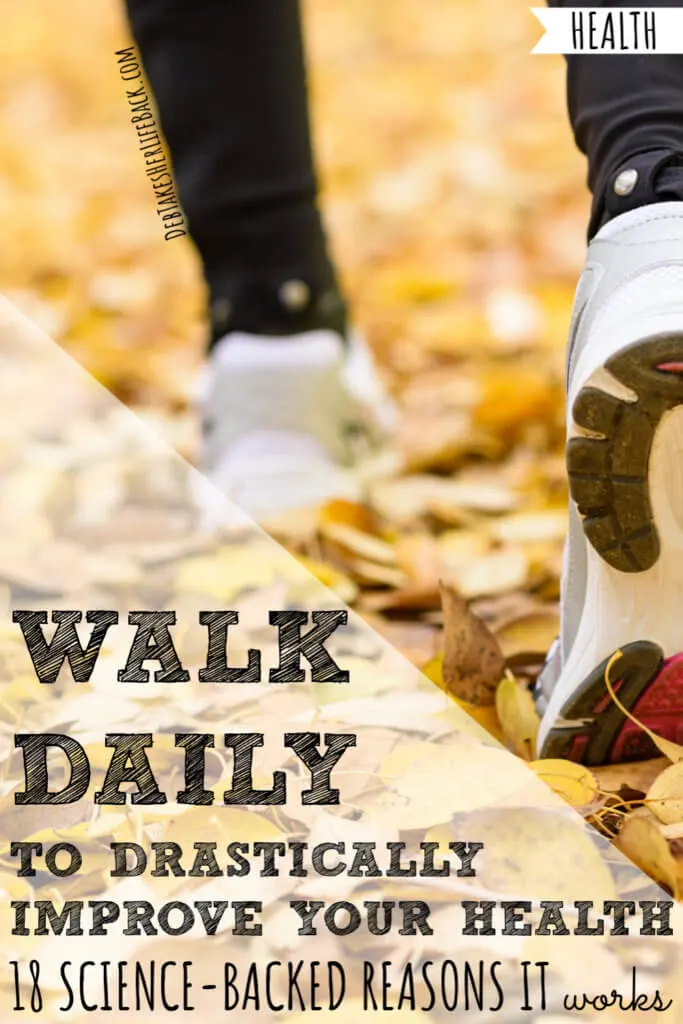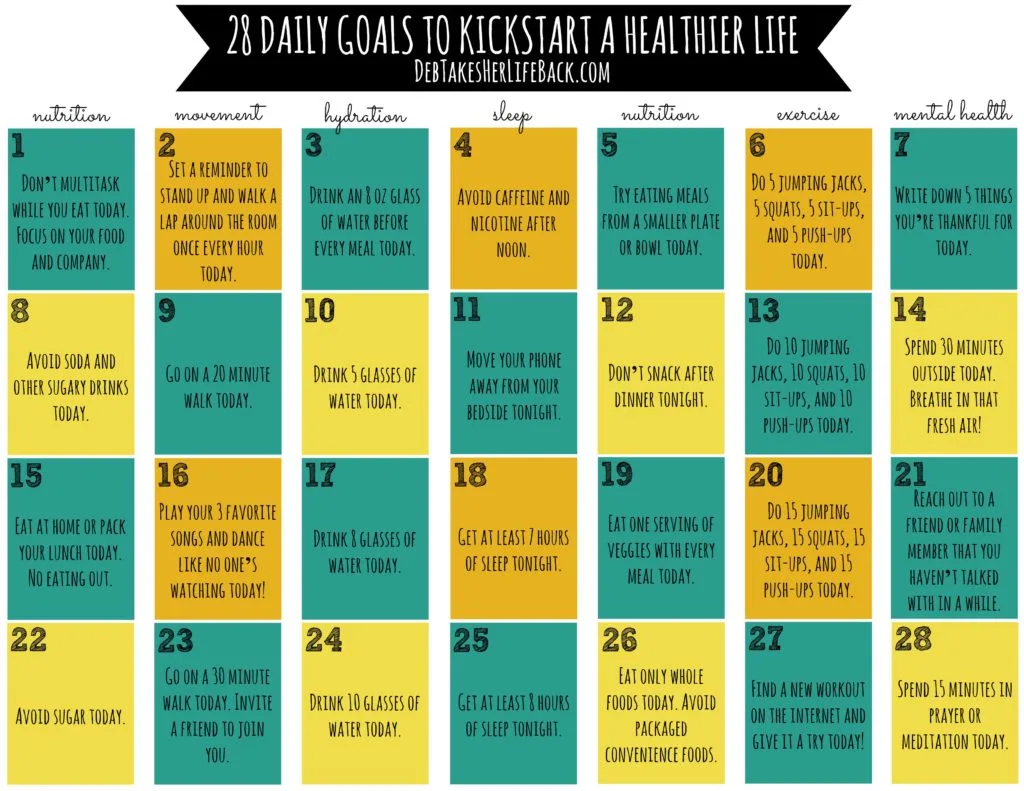Fun fact: Although I work for a tech company by day and as a writer by night, in school I actually studied exercise physiology.
One of my first jobs after graduation was running nuclear stress tests for a large cardiology practice. I’d listen to the cardiologists instruct their patients to walk daily to drastically improve their health, and as a 21-year-old who knew everything, I just knew they were wrong.
I was at the gym daily, lifting heavy weights, running for miles, and attending intense cycling and kickboxing classes. Now those were workouts!
But to simply walk daily? Without interval jogging? Without carrying weights?! No way that was the key to drastically better health.
But the proof was impossible to ignore. I witnessed patients losing weight, improving their balance and general health, and dramatically increasing their aerobic capacity at their next stress test.
I even watched one patient who used to rely heavily on his cane, swing it around wildly as he walked into the office several months later. He wasn’t even using it anymore! He didn’t need to.
Now I’m not claiming that if you walk daily, all of your medical diagnoses will miraculously disappear. But I am saying the benefits of a daily walk are countless and frankly, shocking.

Walk Daily For Your Mood and Energy Levels
Your stress levels will go down.
The movement involved in walking helps to decrease cortisol (a “stress hormone”) levels and provides an opportunity to shift your focus from your worries to your surroundings or breathing or your favorite song playing in your ears. In fact, the Anxiety and Depression Association of America found that a 10-minute walk may be as effective as a 45-minute workout at reducing depression and anxiety.
Your mood will improve.
The knowledge alone that you’re doing something good for yourself is often enough to make you feel like a minion on the set of Pharrell’s “Happy.”
But walking also stimulates the production of endorphins in your brain, especially when it’s done outside in nature. And endorphins are the feel-good chemicals that can act as both a pain reliever and a happiness booster.
You’ll experience an energy boost.
Walking increases your body’s blood and oxygen flow, as well as its levels of epinephrine and norepinephrine, which all work together to help boost energy levels. In fact, some studies suggest that going for a walk may be more effective for your energy levels than grabbing a cup of joe.
Walk Daily For Your Brain
Your memory and cognitive function will improve.
Multiple studies have discovered those who walk daily experience improved memory and executive function (the ability to remember multiple things at once, easily switch between tasks, and focus closely on the task at hand). This is likely because according to another study published in Neurology, walking is associated with a greater volume of gray matter in the brain.
Gray matter is the ultimate measure of brain health! And increased gray matter protects your brain from the risk of developing dementia and other cognitive disorders.
You’ll boost creativity.
Here’s a fun one! Studies have shown a daily walk does wonders for your creativity.
If you listen to music while you walk, you’re improving your “divergent thinking,” or your ability to come up with new, outside-of-the-box approaches to problems.
Listen to a podcast or audio book on your stroll? You’re actively receiving new information and stimulating your imagination, both of which boost creativity levels.
Even when you walk in silence, you’re eliminating multitasking in favor of “single-tasking,” which helps your brain to explore new and more creative approaches to everyday problems, both during your walk and after.

Walk Daily For Improved Health Numbers
You’ll lower blood glucose levels.
A National Walkers’ Health study found those who walked regularly experienced lower blood glucose levels, which resulted in a 12% lower risk of developing type 2 diabetes.
You’ll lower your blood pressure and cholesterol.
The same study also found that regular walkers enjoyed a seven percent reduced risk of developing high blood pressure and cholesterol levels.
The Universities of Boulder Colorado and Tennessee conducted a similar study. It found regular walking lowered blood pressure by as much as 11 points. And that in turn reduced the risk of stroke by 20 to 40%!
You’ll lose weight.
A study from the University of Warwick found those who took 15,000 or more steps per day tended to enjoy a healthier body mass index (BMI) than those who walked less.
You’ll increase your lifespan.
A study in the Journal of the American Geriatrics Society found subjects between the ages of 70 and 90 who regularly left their homes for a walk lived longer than those who didn’t.
Walk Daily For Physical Health
You’ll strengthen your heart.
Studies have found walking at least 30 minutes a day, 5 days a week, can reduce your risk of developing coronary heart disease by roughly 19%. A similar study in The New England Journal of Medicine discovered those meeting the same activity guidelines experienced a 30% lower risk of cardiovascular disease.
You’ll increase bone density.
Developing healthy bone density is an incredibly huge factor in avoiding osteoporosis, fractures, and spine shrinkage. And researchers for the American Bone Health Association found those involved in regular walking programs enjoyed “significant and positive effects” on bone density.
You’ll protect your joints.
When you walk daily, you regularly increase blood flow to and strengthen the muscles surrounding your joints. Combine that with the fact that you’re improving your range of motion and mobility, and it’s no wonder research has found that walking for just ten minutes a day lowers your risk for both arthritis pain and disability.
Ten minutes!
You’ll improve your digestion.
When you walk daily, you’re regularly utilizing core and abdominal muscles. This encourages movement in the digestive system and improved bowel movements.
You’ll improve your vision.
A study in The Journal of Neuroscience revealed those who participate in regular aerobic activity, such as a daily walk, were less likely to experience both retinal degeneration and age-related vision loss.
You’ll boost your immunity.
Research from Arthritis Research & Therapy studied 1,000 adults during flu season. They found those who walked at a moderate pace for 30 to 45 minutes a day experienced 43% fewer upper respiratory tract infections and sick days, and that their symptoms were much more manageable those those who did not walk regularly.
You’ll enjoy better sleep.
Not only does a daily walk boost the effects of melatonin, a sleep hormone, it can also help to reduce stress and pain, which might otherwise lead to sleep disturbances.

Walk Daily For Additional Benefits
You’ll connect with others.
Walk with friends or family members and you’ll experience a rare moment to bond free from phones and other distractions.
You’ll save money.
Not only is walking a free activity, but according to the Journal of the American Heart Association, walking actually saves you money. A study published there found those who participated in regular aerobic exercise such as walking saved big on healthcare costs compared to those who didn’t.
Where should I start?
How much do you have to walk daily to reap all of these benefits? Most studies suggest you walk at a moderate pace/intensity for 30 minutes, 5 days a week. If you’d prefer to spread your walk throughout your day, try walking 10000 steps a day.
That’s not to say you have to start all at once if you’re not able or it’s unsafe for you! I have a friend who lost over 100 pounds walking. But when he first started, he could only make it to his neighbor’s house before he had to turn around.
The next day, he made it two houses down and the next day, three. He kept creeping up his distance until he was able to circle his block, then kept going!
Start where you are. Start however you can. (Just be sure to consult your doctor first if you have any medical conditions.)
Where should you walk? Wherever you believe you’d enjoy it most and are most likely to stick with it.
Some will prefer walking on a treadmill while listening to their favorite podcast. Others will want to walk their dog around the neighborhood after dinner.
Still others will drive to a park to take a walk with their family. Whatever excites and interests you most is going to be your best option.

Alas, despite my 21-year-old pride, the cardiologists were right all along! You can walk daily to drastically improve your health.
You’ll improve your mood and energy levels, brain function, health numbers, physical composition and health, and so much more! So…when will you walk today?

P.S. Want to make small changes that add up to big improvements in your health? Then download our free calendar, 28 Daily Goals to Kickstart a Healthier Life, here.
Disclosure: While all opinions are our own, we are a participant in the Amazon Services LLC Associates Program and other affiliate advertising programs, designed to provide a means for us to earn fees by linking to Amazon.com and affiliated sites, at no additional cost to you.



